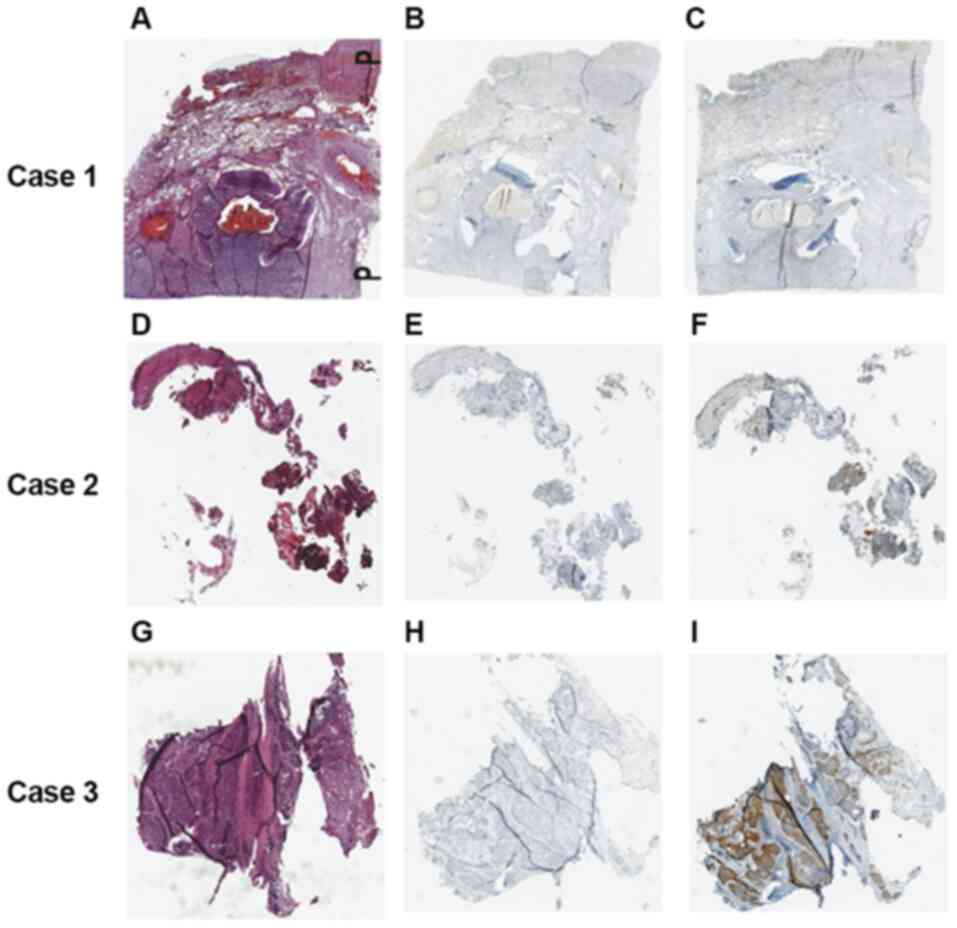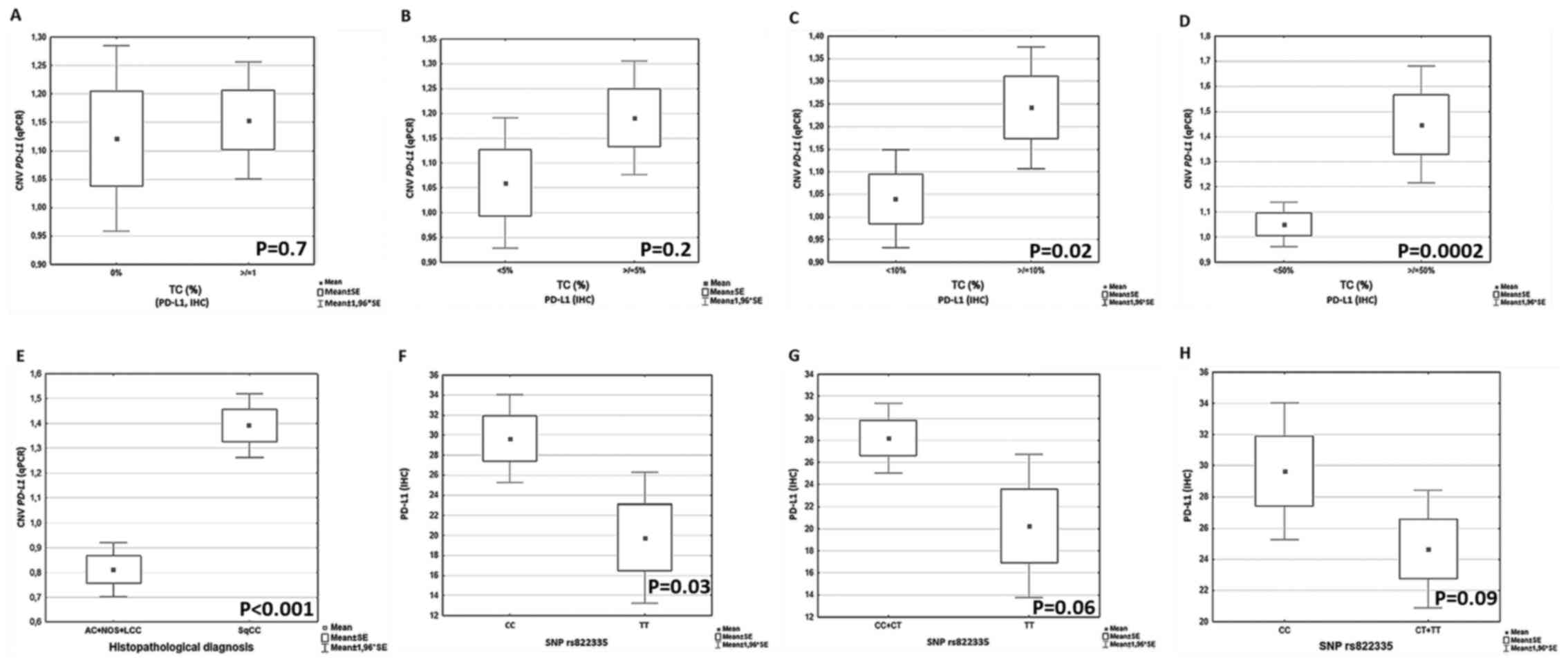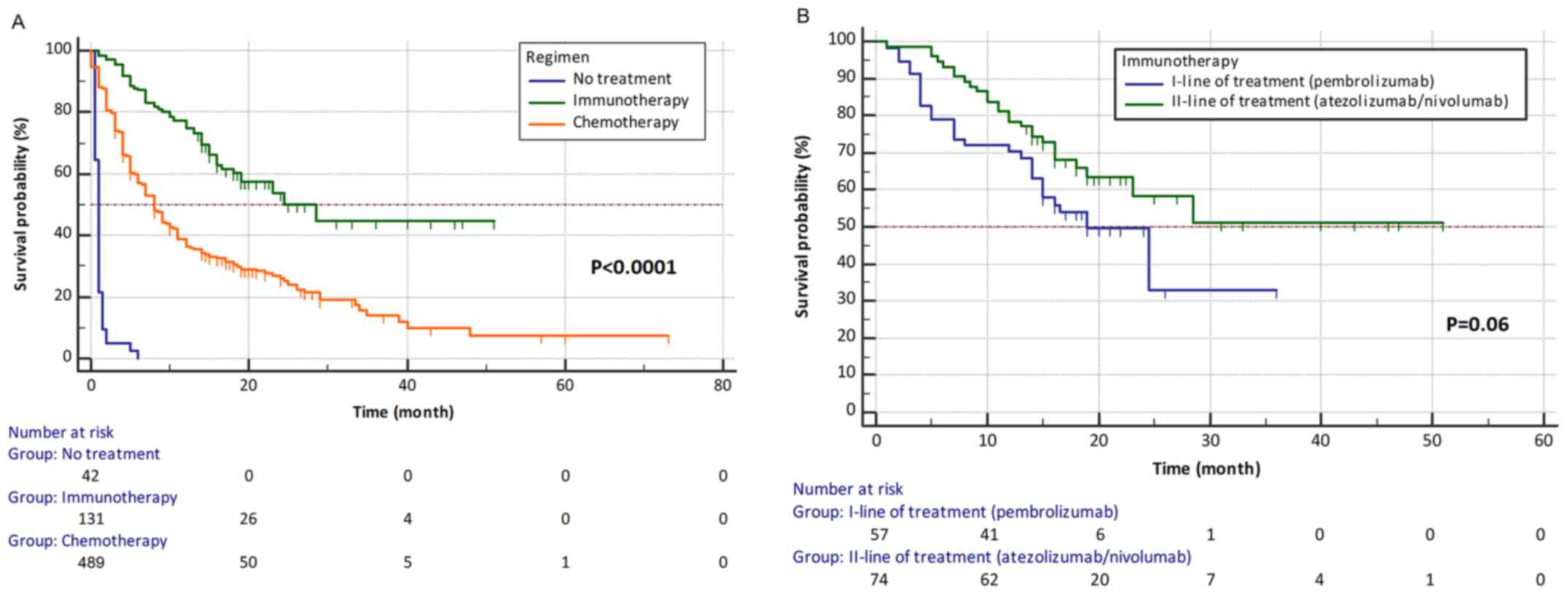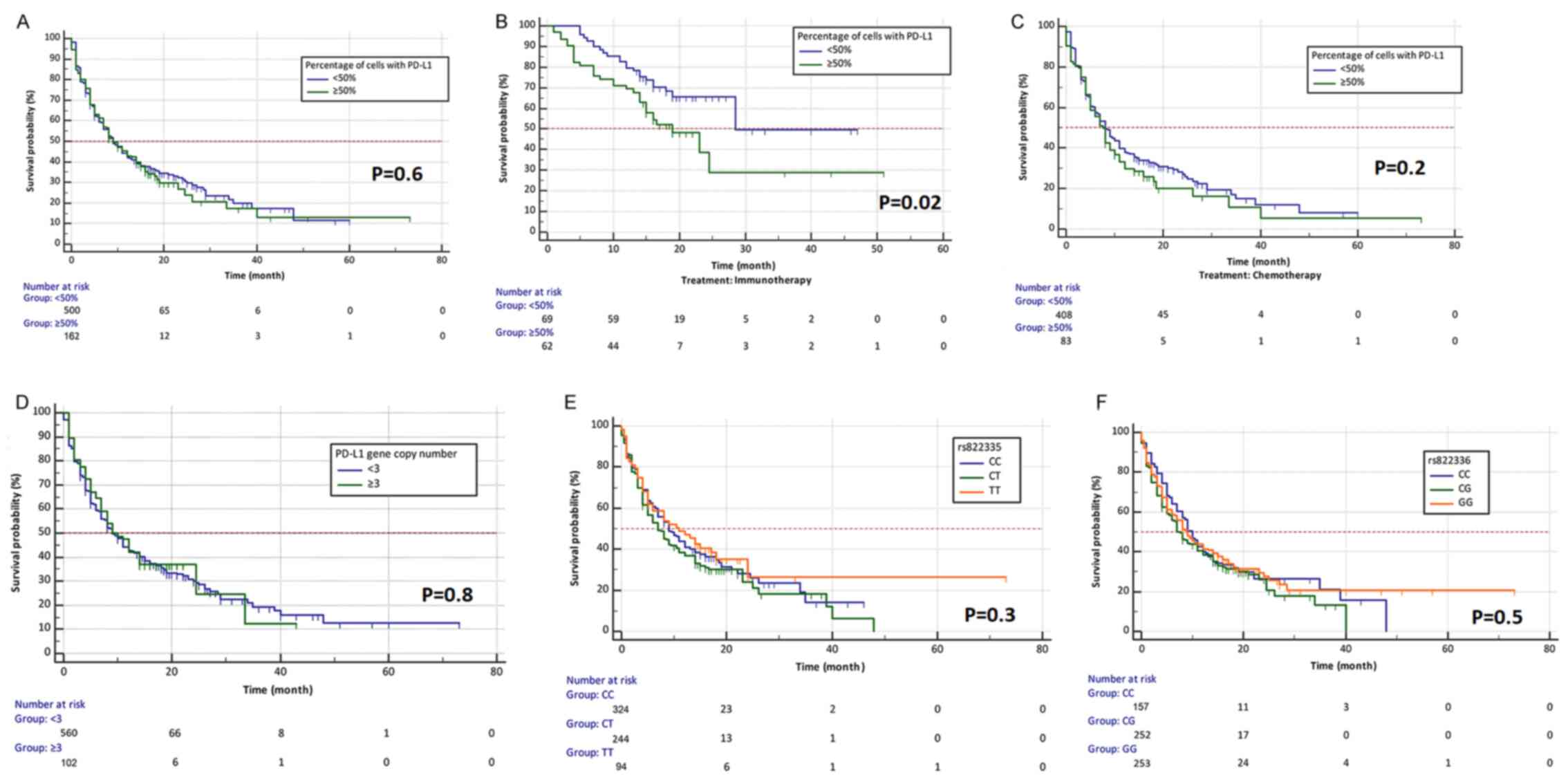|
1
|
European Respiratory Society, . European
Lung White Book. www.erswhitebook.org/files/public/Chapters/19_lung_cancer.pdfJanuary
22–2021
|
|
2
|
Lung Cancer Europe, . Report on Lung
Cancer: Challenges in lung cancer in Europe. https://www.lungcancereurope.eu/wp-content/uploads/2017/10/LuCE-Report-final.pdfJanuary
22–2021
|
|
3
|
Navada S, Lai P, Schwartz AG and
Kalemkerian GP: Temporal trends in small cell lung cancer: Analysis
of the national Surveillance Epidemiology and End-Results (SEER)
database. J Clin Oncol. 24 (Suppl 18):70822006. View Article : Google Scholar
|
|
4
|
Bagley SJ, Bauml JM and Langer CJ:
PD-1/PD-L1 immune checkpoint blockade in non-small cell lung
cancer. Clin Adv Hematol Oncol. 13:676–683. 2015.PubMed/NCBI
|
|
5
|
Iwai Y, Hamanishi J, Chamoto K and Honjo
T: Cancer immunotherapies targeting the PD-1 signaling pathway. J
Biomed Sci. 24:262017. View Article : Google Scholar : PubMed/NCBI
|
|
6
|
Brahmer JR, Govindan R, Anders RA, Antonia
SJ, Sagorsky S, Davies MJ, Dubinett SM, Ferris A, Gandhi L, Garon
EB, et al: The Society for Immunotherapy of Cancer consensus
statement on immunotherapy for the treatment of non-small cell lung
cancer (NSCLC). J Immunother Cancer. 6:752018. View Article : Google Scholar : PubMed/NCBI
|
|
7
|
Reck M, Rodríguez-Abreu D, Robinson AG,
Hui R, Csőszi T, Fülöp A, Gottfried M, Peled N, Tafreshi A, Cuffe
S, et al KEYNOTE-024 Investigators, : KEYNOTE-024 Investigators.
Pembrolizumab versus chemotherapy for PD-L1-positive non-small-cell
lung cancer. N Engl J Med. 375:1823–1833. 2016. View Article : Google Scholar : PubMed/NCBI
|
|
8
|
García A, Recondo G, Greco M, de la Vega
M, Perazzo F, Recondo G, Avagnina A and Denninghoff V: Correlation
between PD-L1 expression (clones 28-8 and SP263) and histopathology
in lung adenocarcinoma. Heliyon. 6:e041172020. View Article : Google Scholar : PubMed/NCBI
|
|
9
|
Hirsch FR, McElhinny A, Stanforth D,
Ranger-Moore J, Jansson M, Kulangara K, Richardson W, Towne P,
Hanks D, Vennapusa B, et al: PD-L1 immunohistochemistry assays for
lung cancer: Results from phase 1 of the Blueprint PD-L1 IHC Assay
Comparison Project. J Thorac Oncol. 12:208–222. 2017. View Article : Google Scholar : PubMed/NCBI
|
|
10
|
Wojas-Krawczyk K, Kalinka E, Grenda A,
Krawczyk P and Milanowski J: Beyond PD-L1-markers for lung cancer
immunotherapy. Int J Mol Sci. 20:E19152019. View Article : Google Scholar
|
|
11
|
Vokes EE, Ready N, Felip E, Horn L, Burgio
MA, Antonia SJ, Arén Frontera O, Gettinger S, Holgado E, Spigel D,
et al: Nivolumab versus docetaxel in previously treated advanced
non-small-cell lung cancer (CheckMate 017 and CheckMate 057):
3-year update and outcomes in patients with liver metastases. Ann
Oncol. 29:959–965. 2018. View Article : Google Scholar : PubMed/NCBI
|
|
12
|
Herbst RS, Baas P, Perez-Gracia JL, Felip
E, Kim DW, Han JY, Molina JR, Kim JH, Dubos Arvis C, Ahn MJ, et al:
Use of archival versus newly collected tumor samples for assessing
PD-L1 expression and overall survival: An updated analysis of
KEYNOTE-010 trial. Ann Oncol. 30:281–289. 2019. View Article : Google Scholar : PubMed/NCBI
|
|
13
|
Bordoni R, Ciardiello F, von Pawel J,
Cortinovis D, Karagiannis T, Ballinger M, Sandler A, Yu W, He P,
Matheny C, et al: Patient-reported outcomes in OAK: A phase III
study of atezolizumab versus docetaxel in advanced non-small-cell
lung cancer. Clin Lung Cancer. 19:441–449.e4. 2018. View Article : Google Scholar : PubMed/NCBI
|
|
14
|
Antonia SJ, Villegas A, Daniel D, Vicente
D, Murakami S, Hui R, Kurata T, Chiappori A, Lee KH, de Wit M, et
al PACIFIC Investigators, : overall survival with durvalumab after
chemoradiotherapy in stage III NSCLC. N Engl J Med. 379:2342–2350.
2018. View Article : Google Scholar : PubMed/NCBI
|
|
15
|
Lee SY, Jung DK, Choi JE, Jin CC, Hong MJ,
Do SK, Kang HG, Lee WK, Seok Y, Lee EB, et al: PD-L1 polymorphism
can predict clinical outcomes of non-small cell lung cancer
patients treated with first-line paclitaxel-cisplatin chemotherapy.
Sci Rep. 6:259522016. View Article : Google Scholar : PubMed/NCBI
|
|
16
|
Ma Y, Liu X, Zhu J, Li W, Guo L, Han X,
Song B, Cheng S and Jie L: Polymorphisms of co-inhibitory molecules
(CTLA-4/PD-1/PD-L1) and the risk of non-small cell lung cancer in a
Chinese population. Int J Clin Exp Med. 8:16585–16591.
2015.PubMed/NCBI
|
|
17
|
Lee SY, Jung DK, Choi JE, Jin CC, Hong MJ,
Do SK, Kang HG, Lee WK, Seok Y, Lee EB, et al: Functional
polymorphisms in PD-L1 gene are associated with the prognosis of
patients with early stage non-small cell lung cancer. Gene.
599:28–35. 2017. View Article : Google Scholar : PubMed/NCBI
|
|
18
|
Du W, Zhu J, Chen Y, Zeng Y, Shen D, Zhang
N, Ning W, Liu Z and Huang JA: Variant SNPs at the microRNA
complementary site in the B7 H1 3 untranslated region increase the
risk of non small cell lung cancer. Mol Med Rep. 16:2682–2690.
2017. View Article : Google Scholar : PubMed/NCBI
|
|
19
|
Yeo MK, Choi SY, Seong IO, Suh KS, Kim JM
and Kim KH: Association of PD-L1 expression and PD-L1 gene
polymorphism with poor prognosis in lung adenocarcinoma and
squamous cell carcinoma. Hum Pathol. 68:103–111. 2017. View Article : Google Scholar : PubMed/NCBI
|
|
20
|
Chen YB, Mu CY, Chen C and Huang JA:
Association between single nucleotide polymorphism of PD-L1 gene
and non-small cell lung cancer susceptibility in a Chinese
population. Asia Pac J Clin Oncol. 10:e1–6. 2014. View Article : Google Scholar
|
|
21
|
Cheng S, Zheng J, Zhu J, Xie C, Zhang X,
Han X, Song B, Ma Y and Liu J: PD-L1 gene polymorphism and high
level of plasma soluble PD-L1 protein may be associated with
non-small cell lung cancer. Int J Biol Markers. 30:e364–e368. 2015.
View Article : Google Scholar
|
|
22
|
Nomizo T, Ozasa H, Tsuji T, Funazo T,
Yasuda Y, Yoshida H, Yagi Y, Sakamori Y, Nagai H, Hirai T, et al:
Clinical impact of single nucleotide polymorphism in PD-L1 on
response to nivolumab for advanced non-small-cell lung cancer
patients. Sci Rep. 7:451242017. View Article : Google Scholar : PubMed/NCBI
|
|
23
|
Vohra M, Sharma AR, Prabhu B N and Rai PS:
SNPs in sites for DNA methylation, transcription factor binding,
and miRNA targets leading to allele-specific gene expression and
Contributing to complex disease risk: A systematic review. Public
Health Genomics. 23:155–170. 2020. View Article : Google Scholar : PubMed/NCBI
|
|
24
|
Mok TSK, Wu YL, Kudaba I, Kowalski DM, Cho
BC, Turna HZ, Castro G Jr, Srimuninnimit V, Laktionov KK,
Bondarenko I, et al KEYNOTE-042 Investigators, : Pembrolizumab
versus chemotherapy for previously untreated, PD-L1-expressing,
locally advanced or metastatic non-small-cell lung cancer
(KEYNOTE-042): A randomised, open-label, controlled, phase 3 trial.
Lancet. 393:1819–1830. 2019. View Article : Google Scholar : PubMed/NCBI
|
|
25
|
Pacheco JM, Gao D and Camidge DR: Extended
follow-up on KEYNOTE-024 suggests significant survival benefit for
pembrolizumab in patients with PD-L1 ≥50%, but unanswered questions
remain. Ann Transl Med. 7 (Suppl 3):S1272019. View Article : Google Scholar : PubMed/NCBI
|
|
26
|
Yoshimura K, Inoue Y, Karayama M, Tsuchiya
K, Mori K, Suzuki Y, Iwashita Y, Kahyo T, Kawase A, Tanahashi M, et
al: Heterogeneity analysis of PD-L1 expression and copy number
status in EBUS-TBNA biopsy specimens of non-small cell lung cancer:
Comparative assessment of primary and metastatic sites. Lung
Cancer. 134:202–209. 2019. View Article : Google Scholar : PubMed/NCBI
|
|
27
|
Inoue Y, Yoshimura K, Mori K, Kurabe N,
Kahyo T, Mori H, Kawase A, Tanahashi M, Ogawa H, Inui N, et al:
Clinical significance of PD-L1 and PD-L2 copy number gains in
non-small-cell lung cancer. Oncotarget. 7:32113–32128. 2016.
View Article : Google Scholar : PubMed/NCBI
|
|
28
|
Livak KJ and Schmittgen TD: Analysis of
relative gene expression data using real-time quantitative PCR and
the 2(-Delta Delta C(T)) method. Methods. 25:402–408. 2001.
View Article : Google Scholar : PubMed/NCBI
|
|
29
|
Krawczyk P, Grenda A, Wojas-Krawczyk K,
Nicoś M, Kucharczyk T, Jarosz B, Reszka K, Pankowski J, Krukowska
K, Bożyk A, et al: PD-L1 gene copy number and promoter
polymorphisms regulate PD-L1 expression in tumor cells of non-small
cell lung cancer patients. Cancer Genet. 237:10–18. 2019.
View Article : Google Scholar : PubMed/NCBI
|
|
30
|
Ikeda S, Okamoto T, Okano S, Umemoto Y,
Tagawa T, Morodomi Y, Kohno M, Shimamatsu S, Kitahara H, Suzuki Y,
et al: PD-L1 is upregulated by simultaneous amplification of the
PD-L1 and JAK2 genes in non-small cell lung cancer. J Thorac Oncol.
11:62–71. 2016. View Article : Google Scholar : PubMed/NCBI
|
|
31
|
NCBI Resource Coordinators, . Database
resources of the National Center for Biotechnology Information.
Nucleic Acids Res. 42:D7–D17. 2014. View Article : Google Scholar
|
|
32
|
George J, Saito M, Tsuta K, Iwakawa R,
Shiraishi K, Scheel AH, Uchida S, Watanabe SI, Nishikawa R, Noguchi
M, et al: Genomic amplification of CD274 (PD-L1) in small-cell lung
cancer. Clin Cancer Res. 23:1220–1226. 2017. View Article : Google Scholar : PubMed/NCBI
|


















